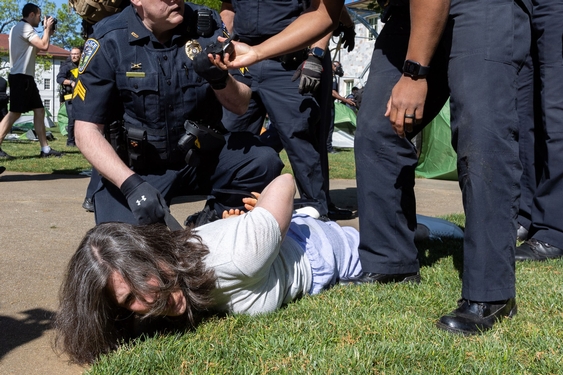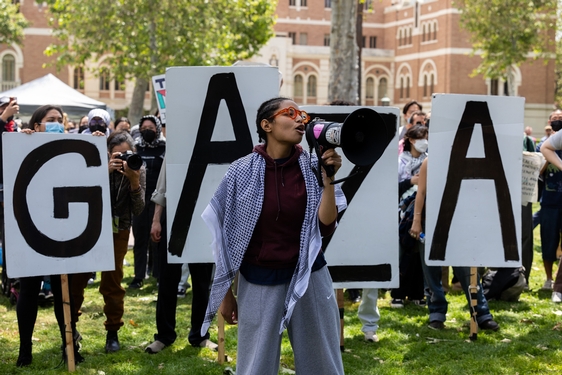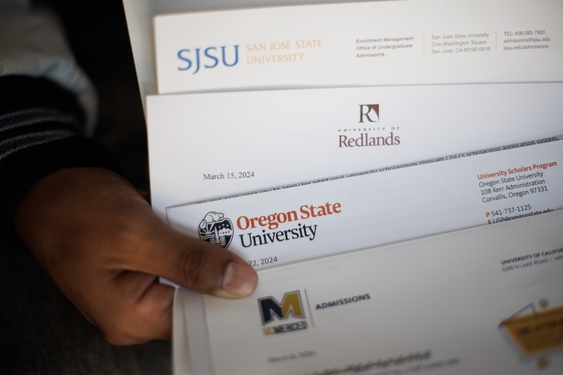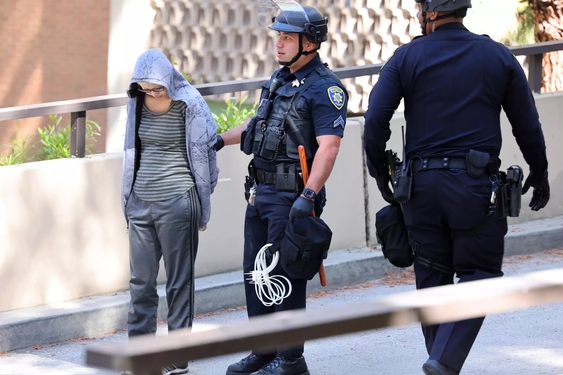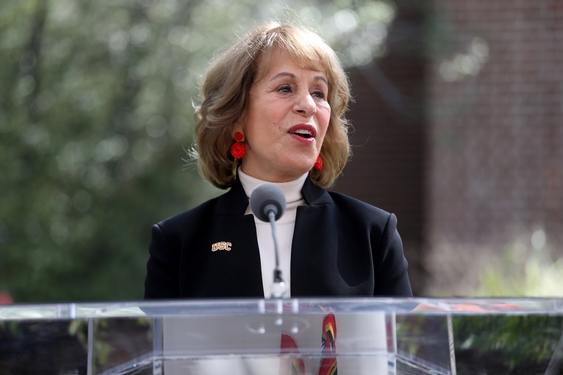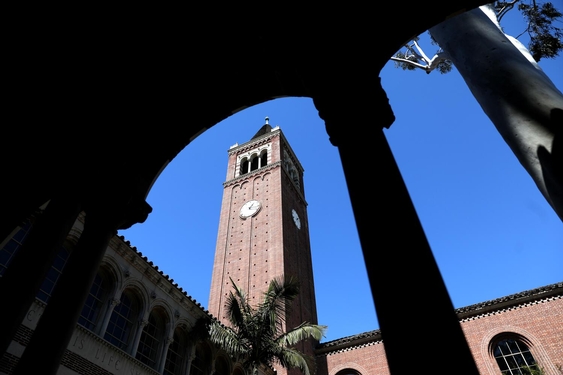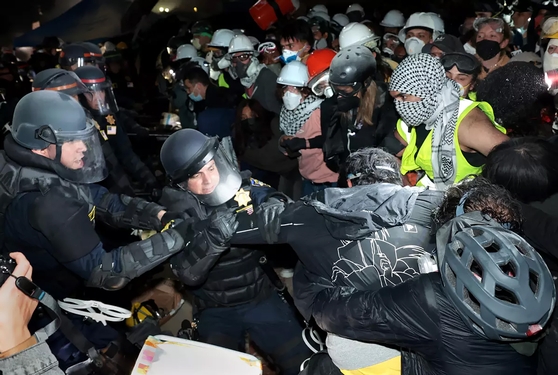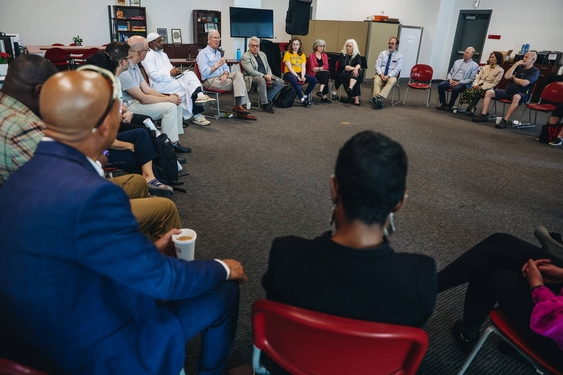The growing campus demonstrations over the Israel-Hamas war have laid bare Democratic divisions in Georgia at a fraught political moment as President Joe Biden and his allies race to recapture the battleground state in November.
State Republicans have also harnessed the turmoil to push a law-and-order message, seizing on images of on-campus clashes to brand pro-Palestinian protesters as “radical” disruptors even though most of the demonstrations in Georgia have been peaceful.
Senior Democrats acknowledged the backlash could pose a significant threat to Biden’s chances of recapturing Georgia. Former U.S. Rep. Carolyn Bourdeaux, a one-term Democrat, likened it to a “dagger at the heart of the Democratic coalition.”
“It is extremely, extremely dangerous in terms of the political fortunes of the Democratic Party,” she told the “Politically Georgia” show. “And I have never really seen this kind of division and anger within the constituencies of the Democratic Party.”
Republicans, meanwhile, have tried to present a united pro-Israel front, condemning the protests with much the same language they used to assail activists who have sought to block the public safety training center in Atlanta.
After pro-Palestinian demonstrators snarled traffic for hours in other major cities, Gov. Brian Kemp said he told law enforcement to “ lock their ass up” if they attempt to block bridges and highways in Georgia.
His bare-knuckled stance was echoed by a trio of Republican officials who could seek to succeed him in 2026.
Lt. Gov. Burt Jones and former U.S. Sen. Kelly Loeffler each called demonstrators “pro-terrorist radicals.” And Georgia Attorney General Chris Carr said the state won’t “stand by while people illegally occupy our schools and threaten and intimidate our students.”
‘Grave injustice’
For Democrats, the response to the tumult has been anything but uniform. Some have expressed support for the demonstrators and criticized the use of force to break up the protests. Some have assailed the demonstrators as antisemitic. Some have stayed silent.
Many struggle with striking a balance between supporting free speech and the right to protest Israel’s policies with language from pro-Palestinian activists calling for the end of Israel that others say clearly crosses into antisemitism.
State Rep. Billy Mitchell, D-Stone Mountain, said he is sympathetic to the civilians in Gaza caught in the war’s crossfire. But he said the pro-Palestinian protests remind him of the language used by the Trump-inspired mob that stormed the U.S. Capitol in 2021.
“I think there’s no excuse for what’s going on in our college campuses, to be quite candid with you,” said Mitchell, one of the Georgia House’s top Democrats and a staunch Biden ally.
“Much of the actions that are taken by protesters resembles, in my mind, what we saw on Jan. 6,” he said. “I don’t think we can criticize what happened on Jan. 6 and say this is acceptable.”
He added that Americans “can’t deny the growing antisemitic attitude that’s going through this country. And we ought to be able to protest in such a way that it doesn’t put people in peril.”
State Rep. Ruwa Romman, the only Palestinian American in the Legislature, echoed other Democratic leaders in condemning antisemitism. But she also called the tough law enforcement response to the rallies a “grave injustice.”
“We cannot collectively punish protesters because of a few bad actors. This is an incredibly dangerous path we’re going on,” Romman said. “If we’re going to start using police to go after speech they don’t like, what’s to stop the GOP from criminalizing abortion rights rallies?”
‘A pivot point’
The protests began after Israel launched military attacks in Gaza in response to the Oct. 7 surprise invasion by the Hamas militants. The attackers killed about 1,200 people — mostly civilians — and took an additional 250 hostage.
Israel countered with air and ground assaults aiming to dislodge Hamas from Gaza. More than 34,000 Palestinians have been killed, according to the Hamas-run health ministry, and the fighting is still ongoing nearly seven months later.
Many of the campus protesters have sought to end U.S. military aid to Israel and, locally, spur colleges and universities to jettison partnerships and study-abroad programs with Israel. They frame the demonstrations as a peaceful movement, though Israel and many of its allies brand them as anti-Jewish hatred.
The demonstrations that roiled campuses in the Northeast and California have only recently spread to Georgia, where they were quickly dispersed by law enforcement, some who used pepper balls, chemical irritants and other tactics.
More than three dozen demonstrators in Georgia have been arrested and charged with trespassing. Nationwide, at least 1,100 protesters have been taken into custody on U.S. campuses since April 18, according to a New York Times tally.
There’s little evidence the fissures are easing. Biden’s plans to deliver the commencement speech at Morehouse College this month might once have been greeted with fanfare. Instead, it was overshadowed by threats of protests by students and faculty members.
At a recent campus gathering, several students confronted Morehouse President David Thomas about the invitation the school issued to Biden in September to speak. One questioned whether that makes the school “complicit” in Israel’s war against Hamas.
”What you just said is the thing that has kept me up at night,” Thomas said in a video posted by Capital B Atlanta. He added that he saw it as an opportunity to hear from a “diversity of views” in the community.
Morehouse Provost Kendrick Brown told “ Politically Georgia” there are no plans to rescind the invitation, though he urged Biden not to use the platform to make a case for reelection.
“It should be about our students,” he said. “It should be about what they’ve accomplished and what they’re going to accomplish as they go out into the world.”
Other tensions emerged after 11 U.S. House members from Georgia voted to approve $26 billion for military aid to Israel and humanitarian help for civilians in Gaza. Among them was U.S. Rep. Nikema Williams, who also chairs the state Democratic Party.
Hours after the vote, the wife of the party’s general counsel took to social media to call Williams an expletive and urged her to take a flight on a plane with a history of safety issues. Horrified by the threat, Williams condemned her for the “veiled way of wishing for my death.”
State Rep. Esther Panitch, the only Jewish member of the state Legislature, said she’s “disgusted” with internal divisions in her party and the House Democratic caucus, which was sharply divided over a bipartisan antisemitism law this year.
“Democrats are at a pivot point nationally,” said the Sandy Springs Democrat. “The party has to figure out if it’s going to pander to the far left or hold the line as a pro-Israel party. There’s a five-alarm fire raging right now.”
___
©2024 The Atlanta Journal-Constitution. Visit at ajc.com. Distributed by Tribune Content Agency, LLC.


